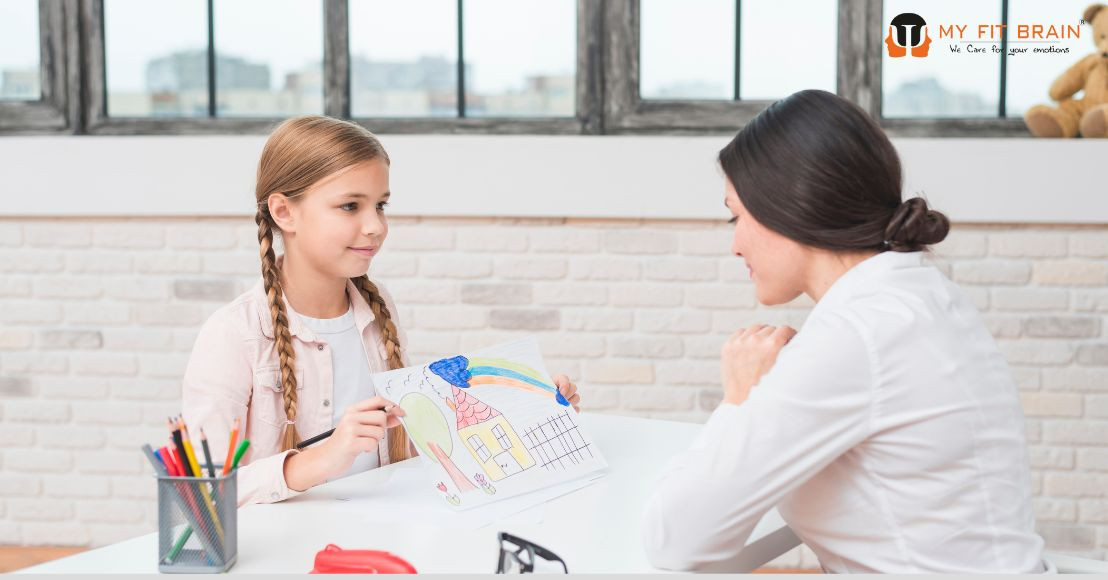Package of 5 Sessions
- Rs.5,999.00/-
Find out the basics on dementia. Learn about its symptoms, causes, forms & treatments.
 PRINCE ASRANI
PRINCE ASRANI  01 Feb 2023
01 Feb 2023  General
General  2.2k Reads
2.2k Reads  16 min Read
16 min Read 
Dementia is the decline in the state of cognitive skills. Essentially, it is a state where we can say that the ability of a person to think and perceive things is decreased. To ensure whether it is dementia or the other disorder, the mental impairment in the patient must affect any two brain functions from the following list:
It is not a disease and it should not be considered as a disease. It is majorly caused by mental illness or any sort of brain injury. Its condition can be mild as well as severe depending upon the person to person. It may also cause a change in the personality of the individual.
This is why this disorder is said to affect the cognitive skills of the person. Dementia generally consists of many sub-types and some of the subtypes of it are progressive which means if the patient is left untreated, the symptoms get worse over time. While some subtypes of dementia are treatable and can be cured with proper treatment and care.

In the early stage of dementia, we can see the following symptoms in the patients:
Dementia is a progressive disorder and it gets worse over time if left untreated. The progression of dementia is different in every person but we can consider these different stages and symptoms of dementia:
It is termed as the lowest stage of dementia or may not be exactly considered dementia. The person may experience forgetting words, thoughts, trouble recalling some events, or short-term memory loss. It may not progress to dementia or any other mental disorder.
The persons at this stage may experience some mild symptoms of dementia that includes:
Persons at this stage might need some care and support from their loved ones. They need some assistance in completing tasks and routine works because the symptoms of dementia may now interfere with the person's daily activities. At this stage, they can be cured with affection and treatment both.
The persons with severe dementia at this stage are likely to have declined physical and mental capabilities.
The symptoms at this stage might include:
The above stages and the progression of patients into these stages depend upon person to person.

There are many causes of dementia. This is generally caused by degeneration and disturbances of brain cells i.e. neurons and their functioning in the brain. In this case, neurons become degenerative which means either neuron cease their functioning or their functioning tends to decrease or the neurons begin to die.
As the result, neurons to neurons connection get hindrances or restrictions i.e. synapses. So the information to and from the internal organs of the body with the brain is not allowed to pass effectively and this causes dysfunctioning of the brain.
There are also many conditions of the brain that contribute to brain diseases and dementia also. These are Alzheimer's disease and vascular dementia.
Here are some common causes of dementia:
The other reason behind dementia is frontotemporal lobar degeneration, which causes damage to the frontal and temporal lobes of the brain. This kind of dementia includes:
Here are some other conditions that contribute to dementia:
Some types of dementia can be effectively treated up to their roots if diagnosed and started treatment early. While some of its kinds can't be reversed if the severe conditions are caught.
Sometimes physical ailments also cause dementia to trigger in the person. Different diseases are accountable for different types of dementia.
Here are some most common types that we have included:
Alzheimer's disease- It is the most common kind of dementia. Around 60-80% of the dementia cases are diagnosed with this type of dementia i.e. Alzheimer's disease.
Vascular Dementia- This dementia is generally caused due to decreased or insufficient supply of blood in the brain. It may be some blockage in the arteries that hinders the sufficient supply of blood into the brain or can be the major cause behind heart strokes.
Lewy Body Dementia- It is caused due to proteins that get deposited into the brain, leaving the brain incapable to transmit signals to and from the internal organs of the body. As a result, the brain some messages are lost, delayed or that can also lead to partial or complete memory loss.
Parkinson's Disease- The patients with Parkinson's disease may also be on the radar of dementia. Symptoms of this type of dementia include ineffective or decreased reasoning or the judgemental ability of the patient, irritated behavior, low perseverance, paranoia, or depression.
Frontotemporal Dementia- This type of dementia is accountable for many types of dementia. This type of dementia is generally caused due to changes in the front and side parts of the brain. Some of the symptoms of this kind of dementia include language and behavioral difficulty and loss of inhibition.
There can even be many other kinds of dementia as well but they have a rare tendency of occurrence, say only 1 in 1 million people.
There can not be defined any particular test for dementia. Rather than that, the psychologists can conduct a series of tests and examinations to analyze its occurrence.
These tests may include:
By these analyses stated above, the psychologist is able to determine the type of dementia in the patients and the degree of severity whether it is mild dementia or the condition is severe.
In some cases, the symptoms of different dementia overlap which means the symptoms in a person with one type of dementia at a time may switch to the dementia of the other type. It makes psychologists determine the type of dementia difficult.
Patients with dementia have two major treatment plans: Medication and non-medicated therapies. Neither any medicine can ensure us the exact cure for dementia nor they are been approved separately for each type of dementia.
Two types of medications are used to treat Alzheimer's disease dementia. These are:
Cholinesterase inhibitors: These medications release a chemical which is acetylcholine. This chemical helps to improve the memory power and improve judgemental power of the patients. It is also helpful to reduce the symptoms of Alzheimer's disease.
Memantine: These medications are generally used in severe cases of dementia. These medications are relatively helpful to reduce the cognitive and behavioral impairments in the patients. These two medications are prescribed with each other and the mild side effects of these medications can occur which include: Nausea, vomiting, diarrhea, dizziness. Some non-drug or non-medicated treatment for dementia includes:
The non-medicated treatment for dementia includes some useful therapeutic treatment or some basic routine activities that are helpful in elevating the most severe symptoms of the disease.
Here are those:
For many decades, persons with dementia are believed to be never treated properly. It was believed that their disorder can't be cured. But the new researchers denied this fact. "A 2017 review found that more than one-third of dementia cases may be the result of lifestyle factors. Specifically, the researchers identified nine risk factors that may increase a person’s chances of developing dementia."
These factors may include:
Dementia disorder is not fatal. This means the dementia patients can spend their whole life with this disorder and it doesn't affect the life expectancy of the patient. They can live for many years after diagnosed this disorder. But the last stage dementia with severe symptoms is considered to be terminal and affects the routine activities of the patients.
It is although difficult for a psychologist to determine the life expectancy of the patient as there are many other physical factors as well which are equally accountable for the life expectancy of the patient and these factors generally influence the length of life in the patients. "In one study, women diagnosed with Alzheimer’s disease lived an average of 5.7 years after diagnosis. Men lived 4.2 years. Life expectancies, the study found, are shorter for individuals with other types of dementia."
Here are some factors that increase the death risks in dementia patients. Which are:
The key thing to remember always is dementia doesn't see the particular age group or gender. It can occur in any age group or to anyone: man or woman. If the patient or their dear one is progressing slowly on the stages of dementia then the symptoms gradually increase and it affects their overall life expectancy.
Although Dementia and Alzheimer's disease, are interrelated they have differences between them that are not purely the same.
Alcoholism or any drug addiction may also make the person on the radar of dementia. "A 2018 study found that the majority of early-onset dementia cases were related to alcohol use. The study found that nearly one-third of early-onset dementia cases were directly linked to alcohol. Plus, 18 percent of people in the study had been diagnosed with an alcohol use disorder.
Alcohol use disorders, the researchers discovered, increase a person’s risk for dementia threefold." Not all drinking is dangerous to your memories and mental health. Moderate levels of drinking (no more than one glass per day for women and two glasses per day for men) may be beneficial to your heart’s health.
Alcohol may be toxic to more than your memories, but how much you drink matters." Is aging increase the chances of dementia? It is normal if a person forgets one or two things in a while. This doesn't mean that the patient has dementia. This is just occasional forgetfulness and nothing serious about it.
The persons including the below stated symptoms might be at the risk of dementia:
Forgetfulness is the first symptom of dementia. The patient must seek medical advice at the earliest to avoid getting it worse.
"Approximately 10 percent of people aged 65 to 74 years and one-quarter of people older than 85Trusted Source have some form of dementia. The number of people diagnosed with dementia or living with it is increasing. This increase is due partly to increasing life expectancy.
By 2030, the size of the population 65 years of age and older in the United States is expected to almost double from 37 million people in 2006 to an estimated 74 million by 2030, according to the Federal Interagency Forum on Aging-Related Statistics Older Americans."
Research is still going on the vastness and severity including diagnosing and treatment of dementia. Scientists are making more 3efforts on giving us the most effective strategy to cope up with this disorder. This research may help the scientist to find out new ways of diagnosing, the latest technologies in diagnosing, and new methods to treat this disorder. The research on brain simulation is still in progress so as its symptoms can be reduced particularly in Alzheimer's disease. Scientists are working their way out to get better possibilities to slow down the progress of Alzheimer's disease and Parkinson's disease particularly in old age patients as their memory power gets reduced over time.
Now scientist is investing more on other factors which trigger dementia-like:
Factors that cause damage or death of neurons i.e. brain cells in the brain tau, which is a protein and is found in neurons of the central nervous system. Oxidative stress, or some chemical reactions taking place in the cells that can damage proteins, DNA, and lipids inside cells.
This ongoing research will help the scientists for sure to help the common man to treat with the latest technologies and medications. And, it can be possible to effectively treat dementia patients.
It is already evident from the ongoing research that it can be cured by rearranging the lifestyle and routine activities. Practicing meditation, mood-boosting exercises, yoga, being socially active can be helpful for the patient to fight dementia.


A breakup can feel like the ground has slipped from beneath your feet. Whet...
 14 Nov 2025
14 Nov 2025  16 min Read
16 min Read 91 Reads
91 Reads _1762843452.jpg)

A breakup can feel like the end of the world. Whether it’s a long-term re...
 11 Nov 2025
11 Nov 2025  16 min Read
16 min Read 148 Reads
148 Reads 

Children feel emotions just like adults -- they only communicate them diffe...
 10 Nov 2025
10 Nov 2025  16 min Read
16 min Read 120 Reads
120 Reads 

Families are living ecosystems. When one component is impacted and the enti...
 06 Nov 2025
06 Nov 2025  16 min Read
16 min Read 170 Reads
170 Reads 

_1762843452.jpg)


_1762843452.jpg)

